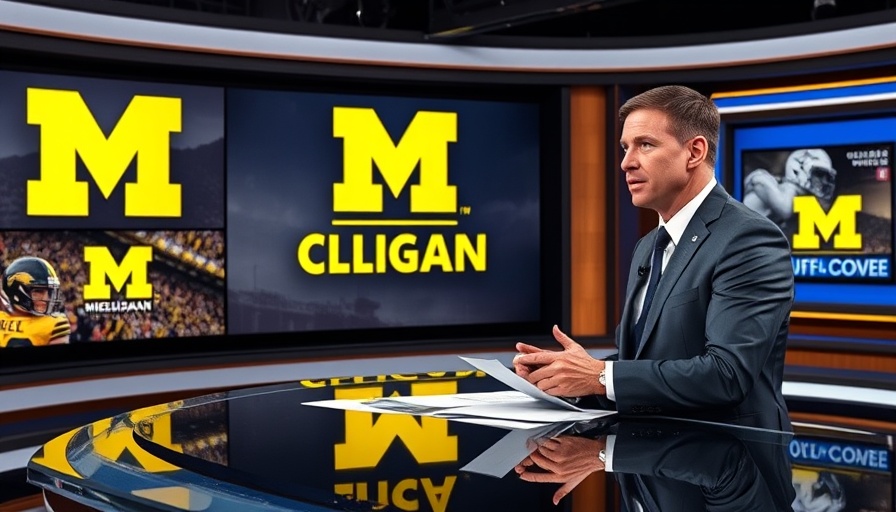
Shaping the Future of Education: Secretary McMahon's Visit to Detroit
The U.S. Secretary of Education, Linda McMahon, recently visited a charter school in Detroit, igniting conversations about the future of education in Michigan. This visit is part of President Trump’s initiative to return educational authority back to state and local levels, a move that some believe could redefine how education is administered across the nation.
In 'Education Sec. Linda McMahon visits Michigan charter school,' the conversation delves into the implications of localizing educational control, prompting further analysis of its potential effects.
During her tour, McMahon emphasized the importance of local engagement, noting that the federal government acts as a funding conduit rather than a direct educational authority. She stated, “The federal government has no set curriculum. We don’t hire teachers. We don’t buy books,” underscoring a philosophy that encourages states to prioritize their unique educational needs.
The Push for Local Control Over Educational Practices
McMahon’s visit sparked discussions among educators and lawmakers regarding how local control can significantly improve educational outcomes. The Speaker of the House in Michigan welcomed McMahon's shift towards state authority in education, suggesting that being closer to the issues allows local officials to tailor curriculums more effectively. This localized approach aims to address specific challenges facing students in their communities.
As local stakeholders become more involved in decision-making, the challenges of a bureaucratic system may be alleviated. Critics, however, express concerns over the states’ ability to manage educational budgets effectively, especially as Michigan's school budget faces uncertainties after lawmakers missed a crucial deadline.
Lessons from Mississippi: The Miracle of Education Reform
One argument raised during the discussions connects Michigan’s educational reform efforts to a phenomenon termed the “Mississippi Miracle.” This term refers to significant improvements in reading scores in Mississippi following the implementation of conservative education reforms. Advocates of similar reforms in Michigan draw parallels, suggesting that targeted local governance can lead to similar advancements in educational success.
While some view this comparison with skepticism, proponents believe that Michigan can learn from Mississippi's experience, implementing flexible funding and innovative programs as a pathway to better educational outcomes.
Key Concerns and Counterarguments in Michigan's Educational Landscape
Despite the optimism expressed by state leaders about returning educational authority to local governments, critics highlight considerable risks. The ongoing budgetary limbo raises questions about how future funding will be allocated. If not managed properly, local control might lead to disparities in resource allocation that can adversely affect students in lower-income districts.
Additionally, there are fears that implementing untested reforms could exacerbate existing inequalities rather than alleviate them. Stakeholders worry that without adequate training and resources, education systems might struggle to meet the redefined standards set by this new local governance approach.
Future Insights: What This Means for Students and Educators
As McMahon’s school visit unfolds in the context of widespread educational reform, the implications for students and educators are significant. Returning control of education to local authorities could empower schools to innovate and cater specifically to their students’ needs. However, it also demands a careful approach in policy-making to ensure it does not disrupt educational equity.
Education is not just about test scores; it’s about developing well-rounded individuals. A focused emphasis on the local needs of educational environments is crucial in building a system that fosters both academic success and personal growth.
Actionable Steps Forward for Michigan’s Educational System
In this crucial time, what can residents and educators do? Advocacy for inclusive and well-rounded education reform is essential. Citizens are encouraged to participate in local school board meetings, voice their thoughts on curriculum changes, and support initiatives that provide equitable resources for all students.
As this pivotal moment unfolds, it remains paramount for the voice of the community to resonate in legislative discussions about educational policies. The perspectives of educators, parents, and students must be prioritized as Michigan embarks on this journey towards redefined education.
If you're interested in engaging with local educational developments and voicing your opinions, now is the time. Keep connected with updates from Michigan education news and participate in community discussions to help shape a better future for every student.
 Add Row
Add Row  Add
Add 



Write A Comment